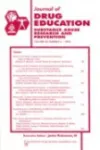| Titre : | Are substance use prevention programs more effective in schools making adequate yearly progress? A study of project alert (2011) |
| Auteurs : | H. KOVACH CLARK ; C. L. RINGWALT ; S. R. SHAMBLEN ; S. M. HANLEY ; R. L. FLEWELLING |
| Type de document : | Article : Périodique |
| Dans : | Journal of Drug Education (Vol.41, n°3, 2011) |
| Article en page(s) : | 271-288 |
| Langues: | Anglais |
| Discipline : | PRE (Prévention - RdRD / Prevention - Harm reduction) |
| Mots-clés : |
Thésaurus géographique ETATS-UNISThésaurus mots-clés PROGRAMME ; PREVENTION ; MILIEU SCOLAIRE ; EFFICACITE ; ALCOOL ; TABAC ; CANNABIS ; EVALUATION |
| Résumé : | This exploratory study sought to determine if a popular school-based drug prevention program might be effective in schools that are making adequate yearly progress (AYP). Thirty-four schools with grades 6 through 8 in 11 states were randomly assigned either to receive Project ALERT (n = 17) or to a control group (n = 17); of these, 10 intervention and nine control schools failed to make AYP. Students completed three self-report surveys. For lifetime cigarette use and 30-day alcohol use, Project ALERT was more effective in schools that made AYP. However, in these schools, Project ALERT negatively affected students' lifetime marijuana use. This study provided some preliminary evidence that prevention programming may not work as well in poorer performing schools; however, further exploration is needed. |
| Domaine : | Plusieurs produits / Several products |
| Affiliation : | Pacific Institute for Research and Evaluation, Chapel Hill, North Carolina 27514, USA |
 Accueil
Accueil



